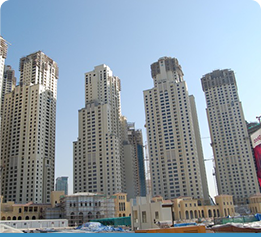Over the last few weeks we have had several piece of news in the media referring to Dubai’s real estate heating up with International Monetary Fund (IMF) and Central Bank of the UAE expressing its concern about rapid price increase which has happened on the back of economic boom and positive market sentiment post winning Expo 2020 hosting status. On the other hand, we have also come across news about slowdown in real estate deals due to mortgage lending cap, increased property registration fees and widening gap in price expectation of buyers and sellers.
Certainly the Dubai Land Department (DLD) and the Central Bank of UAE should be commended for introducing regulations (towards last quarter of 2013) to reduce speculation through higher property registration fees and mortgage cap on borrowings respectively. How much impact these regulations have had to slowdown the market may be difficult to quantify considering that the last few months witnessed frenzied activity in the UAE stock markets where billions of Dirhams poured in on a daily basis (couple of times the average normal daily transaction levels) may have also contributed to reduced activity in real estate – perhaps it was attraction of quick returns that money chased different asset class!
Having been involved in the Dubai real estate market since the advent of freehold, I have seen the market dominated by speculators (typically holding as low as couple of days) and investors. Over the years with changing market and evolving regulations, more end users have come in. Has the composition changed significantly to be dominated by end-users? I have not come across a detailed research on this and I believe the answer is no. Dubai has been an investment destination for real estate where money has poured from within UAE, from the region and beyond for variety of reasons including ease of doing business, life style, safety, tax free returns and this is unlikely to change in the near future. In such a market, it will be a challenge for the regulators to constantly keep the real estate market under check for property price increase, rentals increase and risks associated with such increase on the financial sector and wider economy. The crisis during 2008 was precipitated by non-existence of credit bureau to collate and provide information amongst banks on exposure to real estate for each customer. The regulators have addressed this by forming a credit bureau which is expected to provide such information soon and this initiative will make the UAE financial sector more robust.
An ideal real estate market should have increased number of end users reflecting real and sustainable demand. How can the regulators get increased number of end users in a market which is an investment destination and having majority expatriate population? Perhaps the easiest way would be to remove mortgage cap and enable more first timers/end users into the property ladder. But this would result in having less equity from customers which would expose the financial sector during down turn especially with transient expatriate population. On the other hand, many customers may not be in a position to afford higher down payment due to mortgage cap during price increase scenario. In my view, the regulators have stuck a balance by introducing mortgage cap with minimum down payment/equity at 20% of property value for UAE nationals and 25% for Expatriates. Perhaps this limit could be rationalized at some stage for UAE nationals and Expatriates alike.
Property registration fees 4% is reasonable when compared to international markets. However, the regulators may want to revisit by making this applicable only for first time buyers and increased fees for others. Regulators may also want to consider differentiated approach based on length of time the property is owned thereby penalizing speculators at the time of resale with higher fees as they would typically hold for short period and gratify end users/investors with lower fees for long period. This would encourage more end users and long term investors. Alternatively, higher municipality fees could be charged for owners holding multiple properties based on DLD records. The regulators have sufficient data available through multiple sources such as Immigration, Emirates ID, Ijari (rental contract registration), DEWA (Dubai Electricity and Water Authority) bill to cross verify such information.
The developers could offer a lower price for first time buyers purchasing for end use with eligibility verified through existing Ijari contracts and DEWA bills. Of course, this could be further verified through search on property ownership information from DLD records. Perhaps a good starting point would be for Government owned developers to offer this.
The banking sector could also play its part by enticing first time buyers purchasing for end use with differentiated pricing i.e. lower than normal price and continue to maintain price differentials (subject to of course other risk parameters being acceptable). End user status could be further substantiated throughout the life of mortgage by seeking additional evidence such as DEWA bill.
In conclusion, multiple approaches could be used to segregate end users from rest of the market. However, concerned authorities will have to strike a balance taking into consideration impact on the overall economy and Dubai as an investment destination particularly when its status has been further enhanced as host of EXPO 2020.






